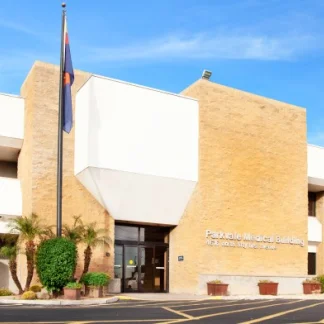Community Medical Services
Community Medical Services is a drug and alcohol rehab in Glendale, Arizona. The...
Terros Health Recovery Center is a behavioral health and drug rehab center in Phoenix, Arizona. They provide services to individuals of all ages. Services are provided in person or through telehealth and are based on a person-centered approach to treatment.
Terros Health Recovery Center offers comprehensive services to individuals seeking support. All treatment is provided on an outpatient basis.
Outpatient Program The outpatient program is appropriate for those who do not need a high level of supervision. The average frequency of meetings is one time each week. Individual therapy, group therapy, and family therapy are provided. Additional services include HIV support, dual diagnosis treatment, mental health treatment, addiction treatment, crisis services, and sober living home assistance.
Medication-Assisted Treatment This program offers FDA-approved medications in combination with mental health counseling. Clients work with trained staff for dosing and participate in therapy to address their addictive patterns and create a relapse prevention plan.
Contact us for more information: (602) 278-1414

Connect with Terros Health Recovery Center by calling their admissions team directly.
(602) 278-1414 Website Get DirectionsCognitive Behavioral Therapy (CBT) is a therapy modality that focuses on the relationship between one's thoughts, feelings, and behaviors. It is used to establish and allow for healthy responses to thoughts and feelings (instead of unhealthy responses, like using drugs or alcohol). CBT has been proven effective for recovering addicts of all kinds, and is used to strengthen a patient's own self-awareness and ability to self-regulate. CBT allows individuals to monitor their own emotional state, become more adept at communicating with others, and manage stress without needing to engage in substance abuse.
Group therapy is any therapeutic work that happens in a group (not one-on-one). There are a number of different group therapy modalities, including support groups, experiential therapy, psycho-education, and more. Group therapy involves treatment as well as processing interaction between group members.
In individual therapy, a patient meets one-on-one with a trained psychologist or counselor. Therapy is a pivotal part of effective substance abuse treatment, as it often covers root causes of addiction, including challenges faced by the patient in their social, family, and work/school life.
Group therapy is any therapeutic work that happens in a group (not one-on-one). There are a number of different group therapy modalities, including support groups, experiential therapy, psycho-education, and more. Group therapy involves treatment as well as processing interaction between group members.
In individual therapy, a patient meets one-on-one with a trained psychologist or counselor. Therapy is a pivotal part of effective substance abuse treatment, as it often covers root causes of addiction, including challenges faced by the patient in their social, family, and work/school life.
In individual therapy, a patient meets one-on-one with a trained psychologist or counselor. Therapy is a pivotal part of effective substance abuse treatment, as it often covers root causes of addiction, including challenges faced by the patient in their social, family, and work/school life.
Community Medical Services is a drug and alcohol rehab in Glendale, Arizona. The...
Jewish Family & Children's Services (JFCS) is a substance abuse and mental h...
Enchantment Workshops, located in Phoenix, Arizona, provides alcohol and drug re...
The Coleman Institute is a private substance abuse treatment facility in Phoenix...